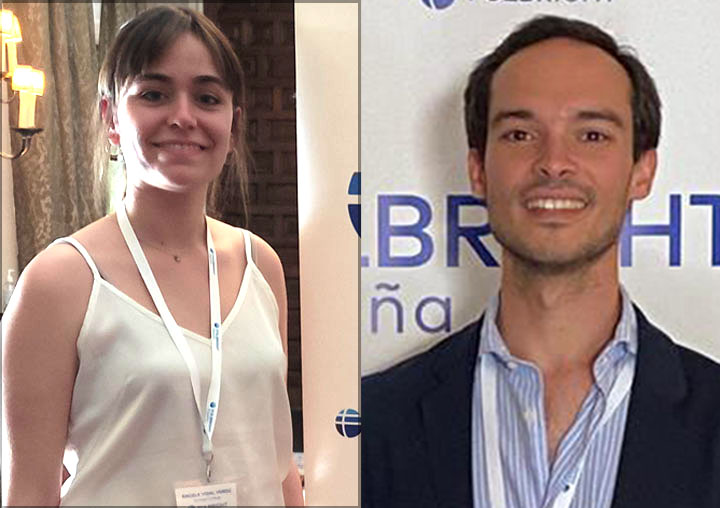Users
Social media
- More details here...
- Address
Parc Científic de la Universitat de València C/
Catedrático Agustín Escardino, 9
46980 Paterna (Valencia) Spain - Email:
iu.i2sysbio@uv.es - Phone:
(+34) 963544810
- Address
Links
Àngela Vidal and Adolfo Rodríguez obtain Fulbright scholarships to carry out a predoctoral research stay in the United States

Investigation & Education
Thesis
Àngela Vidal and Adolfo Rodríguez obtain Fulbright scholarships to carry out a predoctoral research stay in the United States

Àngela Vidal Verdú, doctoral student in the Biotechnology and Synthetic Biology Group of the University of Valencia, and Adolfo Rodríguez Eguren, doctoral student in the Stem Cells and Bioengineering group of the same university, have obtained the prestigious Fulbright scholarship to carry out a research stay in the United States.
A mixed commission made up of representatives of the Ministry of Spanish Foreign Affairs and the US Embassy annually award predoctoral research scholarships at universities or research centers in the United States, in any discipline, for a minimum period of six months and a maximum of twelve.
Adolfo Rodríguez Eguren will spend his stay at Yale University (New Haven, Connecticut), where he will delve into the study of therapies for female infertility. Àngela Vidal Verdú will travel to the Scripps Research Center in San Diego (California), where she will carry out the final part of her doctoral thesis, focused on the bioremediation of plastic waste.
The scholarships are awarded in a very competitive competition. These are fifteen scholarships distributed in three programs: five specific scholarships for doctoral students from universities in Andalusia (financed by the Junta de Andalucía), three specific scholarships for doctoral students from Murcia (financed by the regional government); and 7 general program scholarships open to any doctorate from a Spanish university.
Àngela Vidal studied Biotechnology at the University of Valencia and is currently pursuing a doctorate in the Biotechnology and Synthetic Biology Group, directed by researchers Manel Porcar and Juli Peretó, with a Training contract for University Teachers (FPU). He also collaborates in teaching at the Department of Biochemistry and Molecular Biology of the Universitat de València.
The aforementioned group is located at the Institute of Integrative Systems Biology (I2SysBio), a research center of the Universitat de València and the CSIC. Vidal's line of research is based on microbial bioremediation, the use of microorganisms to degrade contaminating compounds. Specifically, he is working on the bioremediation of petroleum derivatives such as fuel or plastics, as well as with urban waste composed of cellulose.
Vidal Verdú was awarded the extraordinary final degree award in Biotechnology by the University, and in 2019 he received the Ciutat d'Algemesí scientific-technical award for Young Researchers for a work describing the communities of microorganisms that live in marine plastic waste and their ability to degrade it.
Adolfo Rodríguez studied Biotechnology at the Pablo de Olavide University (Seville) and completed the Master in Biotechnology of Assisted Human Reproduction at the University of Valencia, with excellent mention in both. She is currently carrying out her thesis in the framework of female infertility with a FPU contract, within the Células Madre y Bioengineering group, directed by Irene Cervelló. He also collaborates in teaching at the Department of Pediatrics, Gynecology and Obstetrics of the University. His group is part of the IVI-IIS La Fe Foundation.
Rodríguez Eguren's research focuses on the search for regenerative therapies aimed at endometrial pathologies in women with infertility problems. Adolfo Rodríguez has experience in assisted reproduction clinics and in research, after his time at prestigious centers such as the CNIC or the CABD, where he researched cardiovascular and neurodegenerative diseases, respectively.
His line of research pays special attention to uterine pathologies such as Asherman Syndrome, or women with endometrial atrophy (SA/AE), pathological conditions that mean that the embryo cannot implant in the uterus and therefore cannot remain pregnant women.
In her thesis project she analyzes the possible application of umbilical cord platelet-rich plasma both in in vitro and in vivo models (animal models with uterine damage) and in clinical trials with patients suffering from these pathologies.


